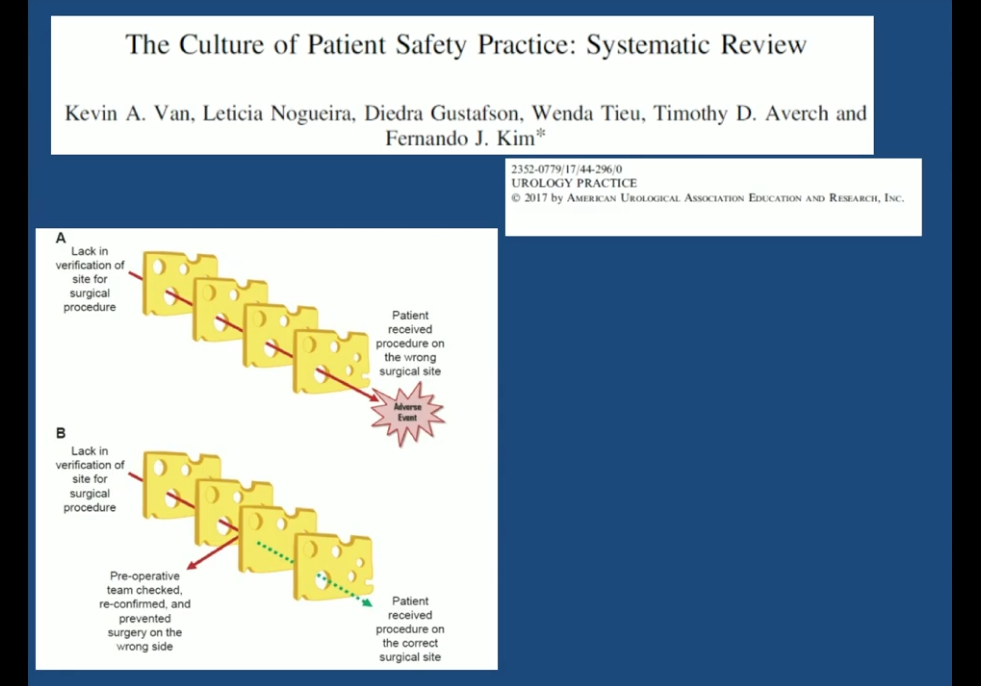Fernando J. Kim MD, MBA, FACS, presented “Culture of Patient Safety Part 2” at the 39th Annual Ralph E. Hopkins Urology Seminar on January 30th, 2019 in Jackson Hole, Wyoming.
How to cite: Kim, Fernando J. “Culture of Patient Safety Part 2” January 30th, 2019. Accessed [date today]. https://grandroundsinurology.com/culture-of-patient-safety-part-2/
Culture of Patient Safety Part 2 – Summary:
Fernando J. Kim, MD, MBA, FACS, discusses internal physician factors and external factors in the current medical field that can put careers and patient safety at risk. He then reviews ways in which systems thinking and professionalism can optimize outcomes in urology practices.
Watch Part One of this presentation here.
Abstract:
Medicine has become increasingly professionalized. As a result, many administrators overseeing medical practices may not fully understand clinical realities. This means that physicians may face punitive measures for behavior results in less than optimal outcomes for patients. In order to optimize outcomes, urologists should familiarize themselves with the major causes of problems in medical practices and develop systems thinking.
Physicians can overestimate their abilities and underestimate their limitations. This tendency exacerbates the dangers posed by internal factors like fatigue, stress, anxiety, depression, and insomnia, as well as external factors like noise, distractions, interruptions, task design, and environmental conditions. A culture of shame and blame often results in the castigation of individual physicians who make mistakes due to the stressful realities of being a medical professional today. This is unproductive, and practices would serve themselves better by putting systems in place to counteract predictable errors rather than placing the burden of the blame at the feet of fallible individuals.
The American Urological Association’s (AUA’s) Quality Improvement and Patient Safety resources provide guidance about how urologists can implement systems to combat physician error. In every stage of care, models like Reason’s Swiss cheese model and SBAR (Situation, Background, Assessment, Recommendation) can, respectively, help prevent errors and facilitate fair, balanced management of the mistakes that do happen.
In the pre-operative setting, the AUA recommends that physicians ensure they understand the patient, not just the surgery itself. Physicians must obtain informed consent, set clear goals and expectations, and perform careful risk assessment. In the intraoperative setting, physicians should have effective pre-operative communication with their teams, and should make use of surgical safety checklists (SSCs). All physicians and assistants must receive appropriate training in the equipment used, and take ergonomic factors into consideration. Overall, a systems-based culture of respect will promote patient safety.
About the Ralph E. Hopkins Urology Seminar
The Ralph E. Hopkins Urology Seminar, or Jackson Hole Seminars (JHS), is a multi-day conference that focuses on patient safety and cutting-edge updates in the assessment, diagnosis, and treatment of urologic conditions. The topics discussed include urologic cancers, stone disease, urologic reconstruction, female urology, infertility, emerging surgical techniques, and general urology. In addition to didactic expert lectures, this conference features unique interactive critique panel. Dr. Kim presented this lecture during the 39th Annual JHS. Please visit this page in order to register for future JHS meetings.
ABOUT THE AUTHOR
Fernando J. Kim, MD, MBA, FACS, is president of the South Central Section of the American Urological Association (SCSAUA), editor-in-chief of AUA NEWS in Portuguese, and associate editor of the Journal of Urology Plus and the Patient Safety in Surgery Journal. Dr. Kim previously served at Denver Health Medical Center where he was chief of urology and has also played a pivotal role in enhancing urological resident rotations by serving as the site residency director and significantly enhancing diversity and inclusion. Dr. Kim earned his MD from the University of São Paulo School of Medicine in São Paolo, Brazil. He was a trauma research fellow at the University of Colorado (CU) Health Sciences Center in Denver and completed an internship in general surgery at the CU Health Sciences Center. Dr. Kim also completed general surgery training at Loyola University's Stritch School of Medicine in Illinois and a fellowship in endourology and laparoscopy at the Brady Urological Institute at the Johns Hopkins University School of Medicine in Maryland.
Dr. Kim is active in the AUA as part of their leadership program, served as their host country liaison, and was awarded their Presidential Citation for his international relations and contributions to minimally invasive urological surgery. Dr. Kim served as president of the SCSAUA. He also received the Presidential Juscelino Kubitschek Medal from the Society of Brazilian Urology, the Ernest E. Moore Trauma Award, and the Societá Italiana di Urologia International Guest Recognition.

